Jarring ’Zone of Interest’ reveals psychological horror of Nazi death camp
 By Steve Crum
By Steve Crum
Days after watching The Zone of Interest, one is affected by the thought of spending an hour and 42 minutes with the most depraved, lost souls who ever existed. It is a harrowing experience realized through a brilliant motion picture.
A huge accolade goes to Jonathan Glazer, who directed and wrote The Zone of Interest, based upon the Martin Amis book of the same name. The title references a designated killing center (ie concentration camp) among various European locations mapped out by Nazis during WWII.
The historical drama is told in German with English subtitles. To add even more authenticity, it was filmed primarily around the infamous Auschwitz  concentration camp in Poland, where more than 900 thousand mainly Jewish civilian prisoners were tortured and massacred during WWII. Shockingly, Auschwitz was but one of over a thousand “zones of interest.”
concentration camp in Poland, where more than 900 thousand mainly Jewish civilian prisoners were tortured and massacred during WWII. Shockingly, Auschwitz was but one of over a thousand “zones of interest.”
Glazer’s film focuses on the site run by Commandant Rudolf Höss, played by Christian Friedel. Moreover, it is the saga of him, his wife and family, whose house and manicured property neighbors the adjoining tall prison wall. How convenient.
The slice of life story, via the adept lens of cinematographer Lukasz Żal, is told from the point of view of Höss family members. By that I 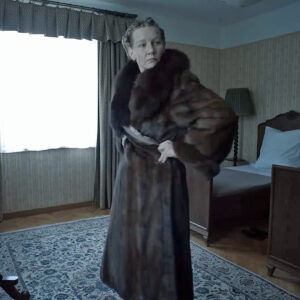 mean the focus is almost entirely upon the husband, wife, kids, and visiting friends. (And there is also a brief visit from wife Hedwig’s mother.) The “friends” are fellow Nazi officers and their families. Early on, Hedwig (Sandra Húller) models with braggadocio a full length ermine coat she has just received. We assume the coat has been taken from one of the new Jewish inmates. If that isn’t sickening enough, she later uses a tube of lipstick, procured from an inmate—without any sign of emotion whatsoever. It’s just another day of surprise gifts for her. She even dumps a load of shirts, pants and skirts on one of her kids’ beds, telling them to grab their choices! And they dive in without hesitation. Hey, it’s their way of life—made possible through death.
mean the focus is almost entirely upon the husband, wife, kids, and visiting friends. (And there is also a brief visit from wife Hedwig’s mother.) The “friends” are fellow Nazi officers and their families. Early on, Hedwig (Sandra Húller) models with braggadocio a full length ermine coat she has just received. We assume the coat has been taken from one of the new Jewish inmates. If that isn’t sickening enough, she later uses a tube of lipstick, procured from an inmate—without any sign of emotion whatsoever. It’s just another day of surprise gifts for her. She even dumps a load of shirts, pants and skirts on one of her kids’ beds, telling them to grab their choices! And they dive in without hesitation. Hey, it’s their way of life—made possible through death.
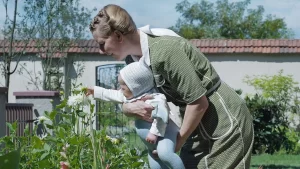 Zone is filmed in near documentary technique reminiscent of the cinéma vérité style of seemingly hidden camera, non-narrated. There is no speaking to the camera. Using that technique, we observe family members watering and trimming plants in the nicely kept garden near the house. There’s an obviously dressed inmate delivering wrapped clothing from the camp next door. The family goes swimming at a nearby lake wherein a corpse floats nearby.
Zone is filmed in near documentary technique reminiscent of the cinéma vérité style of seemingly hidden camera, non-narrated. There is no speaking to the camera. Using that technique, we observe family members watering and trimming plants in the nicely kept garden near the house. There’s an obviously dressed inmate delivering wrapped clothing from the camp next door. The family goes swimming at a nearby lake wherein a corpse floats nearby.
Then there are those surreal scenes of dad Rudolf reading a literally grim fairy tale (Hansel and Gretel) to his daughter at bedtime.
While no images of life inside Auschwitz are shown, we do see its chimney smoking. There is no graphic violence, but there are certainly threats of such. And throughout the film, periodic  sounds of distant gunfire, babies crying, and adults screaming are heard. At other times, the chirping of birds is heard.
sounds of distant gunfire, babies crying, and adults screaming are heard. At other times, the chirping of birds is heard.
At one point, Rudolf is reassigned to another station. This creates stress on his family since they have to move. They do not want to leave their idyllic life. (Interestingly, the Höss house is still standing. Due to its noticeable age, however, a duplicate was built nearby for filming.)
Noteworthy is Mica Levi’s guttural music tones, heard at the opening and closing.
As The Zone of Interest reaches its powerful conclusion, we are left with such blatant, sad irony.
—————
GRADE on an A-F Scale: A
Medieval dark fantasy ‘Damsel’ releases dragon for big time creeps, thrills
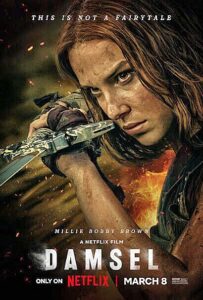 By Steve Crum
By Steve Crum
It’s in the title. That Damsel moniker implies there is a young lady in distress, and so goes the movie. About 30 minutes into the plot, after the gorgeously photographed countryside opening and happy royal marriage plans, the distress portion sets in. Ready yourself for a fiery take on The Most Dangerous Game.
 Sort of.
Sort of.
As written by Dan Mazeau, Damsel spins on the cliché story of human sacrifice to appease a fire breathing dragon. What sets that apart is the casting of Millie Bobby Brown in the lead role of Elodie. After establishing herself a few years back as a very athletically capable fighter in the popular sci-fi series Stranger Things, Brown portrays a bride literally tossed into a dragon’s lair. She then fends for herself big time. So goes the crux of the 110-minute movie. Aided by Larry Fong’s impressive cinematography and David Fleming’s score, Damsel escalates into a showcase of spectacle and heroic adventure.
Besides Brown’s portrayal, there are noteworthy performances by Ray Winstone as Elodie’s troubled father; Angela Bassett (Lady Bamford, Elodie’s stepmom); Brooke Carter (Floria, the younger sister); Nick Robinson (Prince Henry, Elodie’s “husband”); and Robin Wright (Queen Isabelle, Elodie’s “mother-in-law”). The quote marks  designate a marriage gone sideways, so to speak.
designate a marriage gone sideways, so to speak.
While on the run and hiding from the very savvy dragon (voiced by Shohreh Aghdashloo), Elodie encounters a variety of both obstacles and helpers. The latter includes a cavernous room lit by glowing slugs! As for the former, the conniving and seemingly all-knowing dragon provides road block (or cave block) repeatedly.
Bring on the glowing slugs and Elodie’s own shrewdness.
By the time the riveting story segues into a direct confrontation between heroine and dragon (spoiler alert?), it is clear that Damsel is Millie Bobby Brown’s property, her showcase. That plus carries over into a surprising conclusion worthy of the best dragon flicks ever made.
—————
GRADE on an A-F Scale: B+
‘Rustin’ tells fascinating story about heretofore unheralded civil rights leader
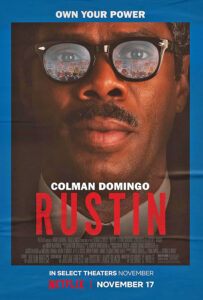 By Steve Crum
By Steve Crum
“It’s a rethinking of our history,” says Oscar nominated Colman Domingo about Rustin, the fascinating story of mostly unknown civil rights leader Bayard Rustin. In it, Domingo plays Rustin—terrifically so.
Directed by George C. Wolfe (Ma Rainey’s Black Bottom and numerous Broadway plays), Rustin opens in 1954, when segregation in the United States was ruled unconstitutional. Cue newsreel footage and the like, establishing the 20th Century historical setting and baseline for Julian Breece’s story and screenplay. (Credit also goes to Dustin Lance Black as screen scribe.)
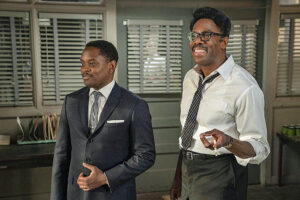 Cut to 1960, when Bayard Rustin was challenging Dr. Martin Luther King (Ami Amen) to lead a rights march at the Democrats’ convention in Los Angeles. It was the beginning of Rustin’s activism, as well as the first time MLK took a stance for non-violence. They butted philosophical heads. Rustin loses the round, and is demoted/fired for his extremism. His passion for activism, however, only increases. Rustin and King are still at odds when the former conceives of a gigantic civil rights march on Washington D. C.
Cut to 1960, when Bayard Rustin was challenging Dr. Martin Luther King (Ami Amen) to lead a rights march at the Democrats’ convention in Los Angeles. It was the beginning of Rustin’s activism, as well as the first time MLK took a stance for non-violence. They butted philosophical heads. Rustin loses the round, and is demoted/fired for his extremism. His passion for activism, however, only increases. Rustin and King are still at odds when the former conceives of a gigantic civil rights march on Washington D. C.
Despite the NAACP and other rights leaders talking Rustin’s plan down, Rustin doubles down on first convincing Dr. King that it would propel the civil rights 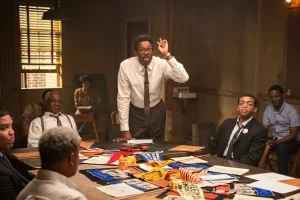 movement…peacefully.
movement…peacefully.
It is no spoiler to note that the Civil Rights March in August of 1963 was successful beyond expectations. Act 3 of Rustin focuses on the preparations for the immense undertaking. How would the expected 100 thousand attendees be transported to D. C.? Where would they be located in the area facing the Lincoln Memorial? What about security?
An excellent ensemble cast portrays civil rights leaders and activists. Among them are Chris Rock as Roy Wilkins, Glynn Truman (A. Phillip Randolph), Jeffrey Wright (Adam Clayton Powell Jr.), Maxwell Whittington-Cooper (John Lewis), Da’Vine Joy Randolph (Mahalia Jackson), and Carra Patterson (Coretta Scott King).
It is an awesome motion picture recreating an awesome time in our nation. Despite all the roadblocks (NAACP disagreement, persecution of Rustin’s gay private life), the various civil rights groups finally  got on board.
got on board.
By the way, as noted in Rustin, over 250 thousand people attended the event, hearing Dr. King’s “I Have a Dream” speech in person.
—————
GRADE on an A-F Scale: A
Compelling ‘American Fiction’ cleverly says much about our culture
 By Steve Crum
By Steve Crum
Let us channel 1982’s Tootsie, a great film that involves identification and perception. Now consider 2023’s American Fiction, which involves the same elements explored in a vastly different construct. In Tootsie, Dustin Hoffman’s out-of-work actor, Michael Dorsey, disguises himself as Dorothy Michaels, and becomes a hit actress on a TV soap opera. Michael needed an acting job with good money, so he went for it—despite ensuing complications.
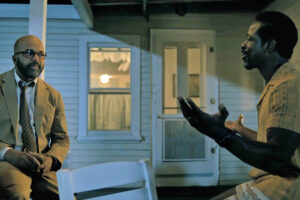 Thelonious “Monk” Ellison, wonderfully played by Jeffrey Wright, is the central character in Director-Writer Cord Jefferson’s comedy-drama American Fiction. Unlike Tootsie’s Michael, Monk is already a making an OK living as a University English professor in Los Angeles. He supplements his income with writing novels that have gotten more critical acclaim than best selling bucks.
Thelonious “Monk” Ellison, wonderfully played by Jeffrey Wright, is the central character in Director-Writer Cord Jefferson’s comedy-drama American Fiction. Unlike Tootsie’s Michael, Monk is already a making an OK living as a University English professor in Los Angeles. He supplements his income with writing novels that have gotten more critical acclaim than best selling bucks.
Then he faces a dilemma of having to support his dementia diagnosed mother Agnes (Leslie Uggams—yes, the singer-actress) in assisted care. Monk is in real financial stress when his sister Lisa (Tracy Ellis Ross) suddenly dies. Now what? He can’t support his mom by himself. And his estranged brother Clifford (Sterling K. Brown) is so distant that he is barely a family member. Again, now what?
So goes American Fiction’s backstory. But, like in Tootsie, meeting a challenge can follow a unique pathway. Exasperated that he even considers it, Monk and his publisher decide to get radical.  To meet popular demand, he lowers his literary standards to write a tacky novel filled with stereotypical black gangsters, violence, drugs, and as much crass language as feasible. He even changes the author’s name to Stagg R. Leigh. Downhearted and thinking no publisher would ever buy his new manuscript, due to its “garbage” nature, he even uses an obscene verb as the novel’s title. The book hooks big time!
To meet popular demand, he lowers his literary standards to write a tacky novel filled with stereotypical black gangsters, violence, drugs, and as much crass language as feasible. He even changes the author’s name to Stagg R. Leigh. Downhearted and thinking no publisher would ever buy his new manuscript, due to its “garbage” nature, he even uses an obscene verb as the novel’s title. The book hooks big time!
There is much more to it as publicity momentum grows and everyone wants to interview the new Monk, “Stagg.” THAT is but one wild and fun element to American Fiction. Monk’s family alone is worth the 117 minutes to watch. That includes his relationship with a new neighbor, Coraline (Erika Alexander).
 American Fiction is a beautifully layered combination of family values, public tastes, personal relationships, stereotypes, and prejudices. Add laughs, tears, and love.
American Fiction is a beautifully layered combination of family values, public tastes, personal relationships, stereotypes, and prejudices. Add laughs, tears, and love.
It evolves into an unexpected tale of story-within-a-story, which will have viewers pondering and wowing at film’s end.
I still am.
—————
GRADE on an A-F Scale: A
Title ‘Leave the World Behind’ well summarizes unsettling plot line
 By Steve Crum
By Steve Crum
Sam Esmail’s Leave the World Behind can be described as comfortably being in the Jordan Peele/M. Night Shyamalan filmmaking genre. Director/Writer Esmail has fashioned an end-of-the-world storyline that keeps pounding our fears throughout its 140 minutes.
If only the story’s resolution was not so ambiguous.
Esmail’s writing and directing works include Comet and the TV series Mr. Robot. As such, similar themes of technology and alienation are central to Leave the World Behind. No one could be as alienated as Julia Roberts’ alpha-type wife and mom Amanda Sanford. Married with kids to the meek Clay (Ethan Hawke in a fascinating, uncharacteristic role), it is Amanda who plans their weekend vacation on Long Island. So they drive  from NYC to an upscale, private home in a pretty remote area amongst trees and forrest animals.
from NYC to an upscale, private home in a pretty remote area amongst trees and forrest animals.
Realizing Amanda and Clay’s extreme personalities is vital the story since interaction (and lack thereof) makes Leave the World Behind work so well. That includes their children, teenager Archie (Charlie Evans) and middle schooler Rose (Farrah Mackenzie).
Conflicts escalate when the owner of the house, G. H. Scott (Mahershala Ali), and his teen daughter Ruth (Myha’la), appear at the  door the very first evening. A blackout has occurred, and they are unable to travel. Now they want their house back. Add the fact that the two families had never met.
door the very first evening. A blackout has occurred, and they are unable to travel. Now they want their house back. Add the fact that the two families had never met.
Mix in strange occurrences such as no phone, radio or TV connections; racial prejudice (the owner and his daughter are Black); and deer and the like are gathering near the house. There are other other off-kilter happenings as well. What about those red leaflets  dropping out of the sky? The survivalist neighbor Danny, ominously portrayed by Kevin Bacon?
dropping out of the sky? The survivalist neighbor Danny, ominously portrayed by Kevin Bacon?
And all those driverless cars nearby, blocking the entrance to the nearby town? Consider that jarring sequence as one of the cleverest ever seen in a movie. I did a triple take.
More baffling threats involve all six central characters, and Director Esmail handles all very well. It becomes a character study of acceptance. After all, 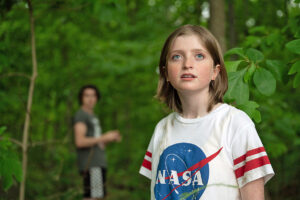 Leave the World Behind is touted as an “apocalyptic psychological thriller.”
Leave the World Behind is touted as an “apocalyptic psychological thriller.”
Near movie’s end, the spotlight is on Rose as she explores a nearby abandoned home in which she finds solace.
It is the most poignant and telling part of the film.
—————
GRADE on an A-F Scale: B+
